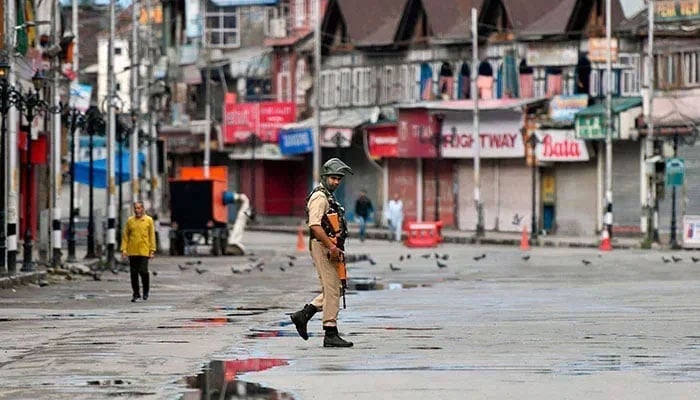Regional peace
People of Kashmir continue to suffer under unprecedented military lockdown and grave human rights violations
PPP Chairman Bilawal Bhutto-Zardari has once again drawn the world’s attention to the critical and unresolved tensions that continue to hinder peace in South Asia. Addressing the deeply entrenched discord between India and Pakistan, he has rightly identified three core issues – Kashmir, water and terrorism – as the key stumbling blocks that must be addressed if the region is to move towards peace and stability. These issues are not new. They have simmered, and occasionally exploded, over decades of mistrust, hostility and missed opportunities. But what makes Bilawal’s latest intervention timely is the global context in which he has spoken. As a nuclear flashpoint, the stakes in South Asia remain dangerously high. Bilawal’s warning that a nuclear confrontation between India and Pakistan would have catastrophic consequences not just for the region but for the world is not mere rhetoric but a rather grim reminder of what is really at stake here.
Occupied Kashmir remains the core dispute. For decades, Pakistan has called for a peaceful resolution in accordance with UN Security Council resolutions and the aspirations of the Kashmiri people. But the situation has only deteriorated since the rise of Indian Prime Minister Narendra Modi and the BJP’s aggressive Hindutva ideology. The revocation of Article 370 in 2019, unilaterally stripping Indian-occupied Kashmir of its special status, was a provocative act in open defiance of international law and bilateral agreements. It was a signal to the world that India is not interested in dialogue but in domination. India’s refusal to engage in meaningful dialogue on Occupied Kashmir, while simultaneously denying any third-party mediation, also exposes a troubling hypocrisy. The issue has always been bilateral in theory, but unilateral in practice. Meanwhile, the people of Kashmir continue to suffer under an unprecedented military lockdown, digital blackouts and grave human rights violations. These cannot be ignored any longer. Then there is the water issue. The Indus Waters Treaty has long served as a rare example of cooperation between the two rivals. But India’s recent actions, particularly the unilateral suspension of the IWT, are a blatant violation of international law. Pakistan’s warning that it will not tolerate any compromise on its rightful share must be taken seriously. Water cannot become a weapon of war, and India’s attempts to manipulate a critical lifeline for millions are an escalation the region cannot afford.
On the matter of terrorism, Pakistan has consistently provided evidence of Indian involvement in funding and facilitating terrorist groups like the TTP and the BLA. India has weaponised allegations of cross-border terrorism against Pakistan while turning a blind eye to its own destabilising activities. A peaceful region cannot emerge from a policy of duplicity and denial. In this context, Prime Minister Shehbaz Sharif’s decision to dispatch Bilawal Bhutto on a diplomatic mission to key global capitals is a step in the right direction. Pakistan has repeatedly extended an olive branch, only to be met with silence, hostility, or worse, aggression. With Bilawal’s experience as a former foreign minister, this outreach could be an opportunity to present Pakistan’s case with clarity and urgency on the international stage. But diplomacy cannot be a one-sided effort. India must shed its belligerent posture and embrace dialogue over denial, negotiation over nationalism and peace over posturing. The cost of inaction is too high. Peace in South Asia requires honesty, courage and political will from both sides. If India truly aspires to be seen as a global power, it must start acting like one. Otherwise, the spectre of conflict – nuclear or otherwise – will continue to haunt the region and the world.
-
 Leonardo DiCaprio's Co-star Reflects On His Viral Moment At Golden Globes
Leonardo DiCaprio's Co-star Reflects On His Viral Moment At Golden Globes -
 SpaceX Pivots From Mars Plans To Prioritize 2027 Moon Landing
SpaceX Pivots From Mars Plans To Prioritize 2027 Moon Landing -
 J. Cole Brings Back Old-school CD Sales For 'The Fall-Off' Release
J. Cole Brings Back Old-school CD Sales For 'The Fall-Off' Release -
 King Charles Still Cares About Meghan Markle
King Charles Still Cares About Meghan Markle -
 GTA 6 Built By Hand, Street By Street, Rockstar Confirms Ahead Of Launch
GTA 6 Built By Hand, Street By Street, Rockstar Confirms Ahead Of Launch -
 Funeral Home Owner Sentenced To 40 Years For Selling Corpses, Faking Ashes
Funeral Home Owner Sentenced To 40 Years For Selling Corpses, Faking Ashes -
 Why Is Thor Portrayed Differently In Marvel Movies?
Why Is Thor Portrayed Differently In Marvel Movies? -
 Dutch Seismologist Hints At 'surprise’ Quake In Coming Days
Dutch Seismologist Hints At 'surprise’ Quake In Coming Days -
 Australia’s Liberal-National Coalition Reunites After Brief Split Over Hate Laws
Australia’s Liberal-National Coalition Reunites After Brief Split Over Hate Laws -
 DC Director Gives Hopeful Message As Questions Raised Over 'Blue Beetle's Future
DC Director Gives Hopeful Message As Questions Raised Over 'Blue Beetle's Future -
 King Charles New Plans For Andrew In Norfolk Exposed
King Charles New Plans For Andrew In Norfolk Exposed -
 What You Need To Know About Ischemic Stroke
What You Need To Know About Ischemic Stroke -
 Shocking Reason Behind Type 2 Diabetes Revealed By Scientists
Shocking Reason Behind Type 2 Diabetes Revealed By Scientists -
 SpaceX Cleared For NASA Crew-12 Launch After Falcon 9 Review
SpaceX Cleared For NASA Crew-12 Launch After Falcon 9 Review -
 Meghan Markle Gives Old Hollywood Vibes In New Photos At Glitzy Event
Meghan Markle Gives Old Hollywood Vibes In New Photos At Glitzy Event -
 Simple 'finger Test' Unveils Lung Cancer Diagnosis
Simple 'finger Test' Unveils Lung Cancer Diagnosis




